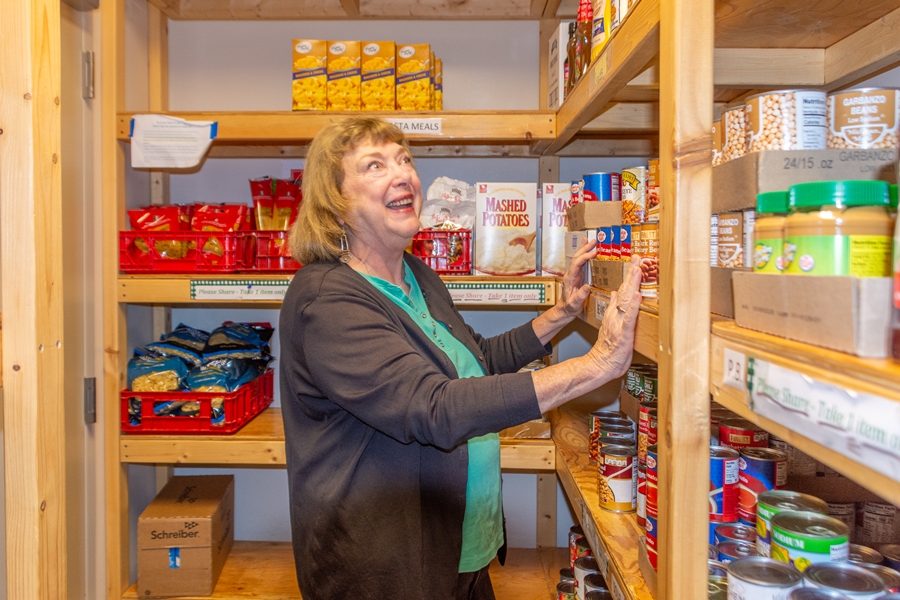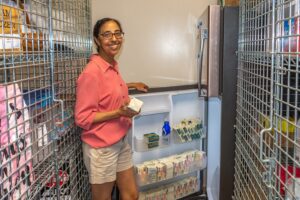WELLFLEET — With a new federal budget that cuts SNAP benefits (known as food stamps) and Medicaid, local food pantries are preparing to address what they expect will be an increase in food insecurity on the Outer Cape.

“It’s going to be harder and harder to stay ahead of the need,” said Maria Burks, a volunteer at the Wellfleet Food Pantry.
Over 11,000 households in Barnstable County received monthly help from SNAP, the federal Supplemental Nutrition Assistance Program, as of 2023, according to the most recent data available from the U.S. Census Bureau. According to a Mass. Law Reform Institute analysis, the new budget will put 175,000 state residents at risk of losing some or all of those benefits.
At the same time, Census data show that more than 41,000 people in Barnstable County had their health care covered through Medicaid. Rollbacks will add medical bills to people’s basic expenses.
The losses of both forms of support are likely to lead to higher demand at local food banks.
“If your family doesn’t have enough SNAP benefits at the end of the month, they’re going to come to their nearby food pantry, so when these changes go into effect, we expect to see more folks relying on our 600 partners,” said Kate Adams, a senior public policy manager at the Greater Boston Food Bank, which distributes food to all of the Outer Cape towns’ pantries.
Volunteers at the Wellfleet Food Pantry said they saw their busiest day ever last month, with a record 42 people. “Even though we had a delivery that morning, by the end of the day our shelves and our freezers and our refrigerators were looking rather bare,” said Cindy Batchelder, one of the volunteers.
According to Katie Wibby, CEO of the Lower Cape Outreach Council, a nonprofit that helps Outer Cape food pantries coordinate with the Greater Boston Food Bank, Wellfleet and Truro have both seen 21-percent increases in visits at their food banks so far this year.
The optimistic explanation as to why more people are visiting food pantries is that there is more awareness of the service they provide. But the data offer a bleaker explanation: increased hunger across the region. In Barnstable, Dukes (Martha’s Vineyard), and Nantucket counties, 34 percent of the residents faced food insecurity at some point in 2024, according to a Greater Boston Food Bank study. That number was 20 percent in 2023.
About 80 percent of the food the Wellfleet pantry stocks comes from the food bank in Boston, while the rest comes from cash donations. Volunteers at the pantry buy some items, such as cooking oil and toilet paper, from local supermarkets using those funds.
In February, Wellfleet’s food pantry got a grant from the nonprofit Broadway Cares/Equity Fights AIDS. In a letter presenting the grant, Executive Director Danny Whitman cited “the many challenges thrust upon us by the unsettled political landscape.”
At the Provincetown Food Pantry, the need used to fluctuate seasonally; now, there’s high demand year-round, according to Nicola Vichert, who manages the pantry there. “It ticks up in the summer because we have a lot of J-1 people using the pantry, but even when they leave at the end of the season, we’re still busy right through the winter,” she said. “On a busy day, we could easily have 30 or 40 clients.”
Ana Carrillo, who cleans hotel rooms at the Bradford in Provincetown, hasn’t received SNAP benefits, but her wages still aren’t enough to cover her expenses and pay for food. She told the Independent she’s been using the Provincetown pantry for six years.
Though she is 65 and retired, Carrillo still works 32 to 36 hours per week for $20 an hour, eight or nine months each year. She’d like to work more hours, but then money would be withheld from her Social Security benefits.
“I wish I could work full-time, but then I’d have to pay them,” said Carrillo. “The pantry helps a lot.”
Preparing for the Worst
The people who visit the Wellfleet food pantry include seasonal workers, shellfish workers, seniors on fixed incomes, homeless people, and people working two or three jobs, the volunteers said. Recently, Burks said, they were soliciting donations outside a local grocery store when a woman walked past them saying, “I’m on SNAP, and I’m expecting to lose it any day.”

For the last few months, the Wellfleet Food Pantry has been operating out of a 720-square-foot trailer in the parking lot of Our Lady of Lourdes Catholic Church on Route 6. It’s larger than the space they had before but still not big enough to store sufficient supplies for the growing number of people who come by.
More room for the pantry can’t come soon enough, Burks said. Earlier this month, the Wellfleet Select Board accepted the food pantry’s proposal to lease town land at the senior center using money raised through private donations. They hope their new space, which could be as large as 2,000 square feet, will be ready by the end of 2026.
The Lower Cape Outreach Council has also been working to increase capacity at its main food bank in Orleans in anticipation of Trump administration policies.
“We’re tripling the size of it, so we’re hoping that having the increased capacity will allow us to source more food at reduced cost because we can buy in bigger bulk, and we’re putting in a walk-in freezer,” said Wibby.
At the Truro Food Pantry, manager Barbara Bond has already had to start limiting how much food each person is allowed to take — something she hates to do, she said, though she anticipates needing to do it more often. “We don’t know how bad it’s going to be,” Bond said. “I put out requests in various ways for donations.”
According to a worst-case-scenario estimate by the Greater Boston Food Bank, if everyone who loses SNAP benefits turns to food banks, demand could increase by as much as 55 percent.
Even before the latest cuts, the Greater Boston Food Bank faced a challenge from the Trump administration. A few months ago, it had a $2.5-million shipment of food canceled by the federal government. While the current budget doesn’t affect funding for food banks, officials fear that shipments could be canceled again in the future.
“We did not receive a reason from the federal government as to why that was canceled,” said the food bank’s Adams. “Things are pretty unpredictable right now.”
